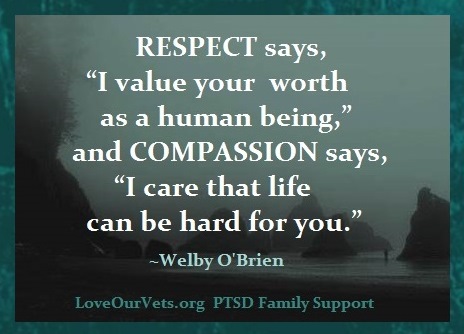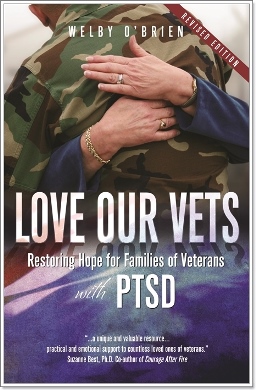When I was first learning about PTSD, I was advised to be careful. “They are fragile,” I was told. Maybe. Maybe not. Certainly our veterans and military service members – and all those who battle PTSD – do not wish to be viewed as fragile! But are those who face the challenges of PTSD to be treated differently because of it? And if so, how do we treat them in a way that is most helpful to them as well as beneficial to our relationship with them?
Our beloved veterans served in amazing capacities including combat, aviation, intelligence, medical, and many more. Whether enlisted or officers, most deserve the highest honor and appreciation for their service and sacrifices. And no matter their rank, role or duties, they have all been deeply and profoundly impacted by war. Especially those who were wounded, whether visibly or not. PTSD is such a wound, and demands a lifetime of sacrifice 24/7. From the vet as well as their loved ones.
What I am learning to remember is that the PTSD is the culprit, irrespective of the person.
It is not the individual who is fragile, but the PTSD itself.
Post Traumatic Stress imposes a constant barrage of symptoms hammering at the core of those who face it. The need we feel as loved ones to walk on eggshells is very real. We do all we can to avoid triggering the PTSD, and falling victim to its fallout. The sensitivity of the PTSD, its hair-trigger, is the fragility we sense. It has nothing to do with the strength, character, worth or heart of the vet we love. It is the nature of the condition.
All that being said, how do we treat those we love who have PTSD? Bottom line: with respect and compassion. Just like everybody else. Some have said they resent being treated like a lost puppy. And yet there may be others who need that special nurturing. We all do at times. Either way, compassion always needs to be communicated with respect. Not in pity, looking down on them as a weaker person, but in caring for their well-being, and desiring the very best for them. In spite of the PTSD.
Nor is it an open invitation for abuse or bad behavior. Ideally, the respect and compassion goes both ways. As I remind us in LOVE OUR VETS: Restoring Hope for Families of Veterans with PTSD, it is healthy and necessary to communicate our expectations to be treated the same. With respect and compassion.
Respect says, “I value your worth as a human being,”
and compassion says, “I care that life can be hard for you.”
We as loved ones and caregivers also need to stay mindful of our own needs, and be careful to not burn out in our well-meaning attempts to help. We cannot fix it. The PTSD will always be there to some degree, no matter how much progress is made. I love how when we take care of us, and reach out in love and kindness and respect, we foster an environment in which love and hope and growth can thrive.
And it does not matter how strong a person may or may not be; caring and respect are desperately needed by all of us. Hopefully your home will be blessed with both today!
.









